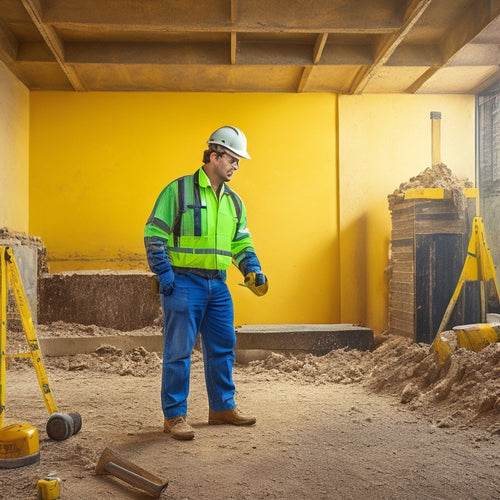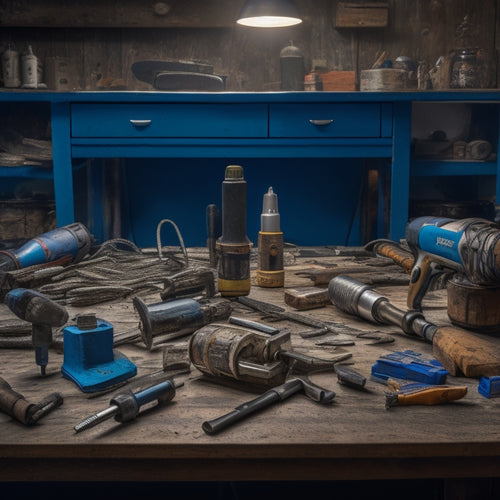
5 Best Small Pumps for Home Renovation Projects
Share
When selecting a small pump for your home renovation project, you'll want to take into account factors like pump capacity, portability, and power source to guarantee you're getting the right fit. Top brands like Putzmeister, Sany, and CIFA offer features like high-pressure capabilities, advanced hydraulic systems, and compact designs that can make a big difference. You'll also want to think about rental options, safety precautions, and maintenance requirements to keep your project on track. By understanding your project's specific needs, you can narrow down your choices and find the perfect pump - and we'll help you do just that.
Key Takeaways
• For home renovation projects, consider pumps with lower capacity (10-20 m³/hr) and portable designs for easy movement around the site.
• Assess the project's pressure requirements and choose a pump that can handle the necessary pressure rating for efficient operation.
• Evaluate the power source options (electric, gasoline, or diesel) based on the project's energy needs and availability.
• Select a pump with a suitable flow rate to ensure the project's concrete pouring needs are met, and consider noise level for minimal disruption.
• Consider renting a small pump for short-term projects, weighing the rental duration and equipment selection against the cost of buying a pump.
Types of Small Concrete Pumps
When selecting a small concrete pump for your home renovation project, you'll encounter several types, each designed to tackle specific tasks and offer unique benefits.
One key distinction is pump capacity, which determines the amount of concrete you can pump per hour. For smaller projects, a pump with a lower capacity (e.g., 10-20 cubic meters per hour) might suffice. However, if you're working on a larger scale, you'll need a pump with higher capacity (e.g., 50-100 cubic meters per hour).
Another important aspect to take into account is portability options. You may need a pump that's lightweight and compact, allowing for easy transportation around the job site or up stairs. In this case, a trailer-mounted pump or a pump with a detachable engine might be ideal. On the other hand, if you're working on a larger site, a stationary pump with a longer hose might be more suitable.
Understanding the different types of small concrete pumps and their unique features will enable you to make an informed decision, ensuring your project runs smoothly and efficiently. By matching the right pump to your project's specific needs, you'll avoid costly delays and achieve professional-grade results.
Factors to Consider for Selection
As you narrow down your options among the various types of small concrete pumps, you'll want to evaluate several key factors to confirm you choose the right one for your home renovation project. One essential consideration is the pump's pressure ratings, which determine the pump's capacity to handle the required pressure for your specific project. You'll also want to think about pump portability, as you'll likely need to move the pump around the job site.
| Factor | Consideration |
|---|---|
| Pressure Ratings | Verify the pump can handle the required pressure for your project |
| Pump Portability | Consider the pump's weight, size, and mobility for easy transportation |
| Power Source | Decide between electric, gasoline, or diesel-powered pumps based on your needs |
| Flow Rate | Choose a pump that can handle the required flow rate for your project |
| Noise Level | Consider the pump's noise level and potential impact on your work environment |
Top Brands and Their Features
You'll find that top brands like Putzmeister, Sany, and CIFA offer a range of small concrete pumps that cater to diverse project requirements. When comparing these brands, you'll notice distinct feature highlights.
Putzmeister's small pumps are known for their high-pressure capabilities, making them ideal for complex pours. Sany's pumps, on the other hand, boast advanced hydraulic systems that guarantee efficient and smooth operation. CIFA's small pumps are renowned for their compact design, allowing for easy maneuverability in tight spaces.
In terms of brand comparisons, Putzmeister and Sany are often pitted against each other for their high-performance capabilities. However, CIFA's focus on compactness sets it apart from its competitors.
When selecting a brand, consider the specific demands of your project. If you need high-pressure pumping, Putzmeister might be the way to go. For efficient operation, Sany could be the better choice. If you're working in tight spaces, CIFA's compact design might be the deciding factor.
Small Pump Rental and Buying Options
Your project's budget and timelines determine whether renting or buying a small concrete pump is the most cost-effective and efficient option for your home renovation.
If you're working on a one-time project with a limited scope, renting a pump might be the way to go. On the other hand, if you're a contractor or homeowner who plans to tackle multiple projects, purchasing a pump could be a worthwhile investment.
When considering pump rental, keep the following factors in mind:
-
Rental duration: How long will you need the pump, and what're the rental fees for the desired timeframe?
-
Equipment selection: Does the rental company offer a range of pumps suitable for your project's specific needs?
-
Delivery and pickup: Are delivery and pickup services included in the rental fee, or will you need to arrange for transportation?
- Maintenance and support: Who's responsible for equipment maintenance and troubleshooting during the rental period?
Weighing these factors will help you make an informed decision about whether pump rental or purchasing is the best option for your home renovation project.
Safety Precautions and Maintenance
Before operating a small concrete pump, make certain you understand and follow the manufacturer's safety guidelines and recommended maintenance schedule to minimize the risk of accidents and equipment failure.
You'll want to guarantee you're familiar with the pump's electrical system to avoid electrical shocks or fires. Check the power cord and connections for any signs of damage or wear, and never operate the pump in wet conditions.
During pump operation, keep a safe distance from the equipment and avoid wearing loose clothing that could get caught in the machinery. Make certain the area is well-ventilated and free from flammable materials.
Regularly inspect the pump's hoses and fittings for signs of damage or leaks, and replace them as needed. In addition to following the manufacturer's maintenance schedule, perform daily checks on the pump's oil and fluid levels, and top them off as necessary.
Clean the pump's filters and valves regularly to guarantee peak performance and prevent clogs. By following these safety precautions and maintenance tips, you'll be able to operate your small concrete pump safely and efficiently, assuring a successful home renovation project.
Frequently Asked Questions
Can I Use a Small Pump for Commercial Construction Projects?
You're wondering if a small pump can handle commercial construction projects.
While small pumps excel in specific applications, they're not always suitable for large-scale commercial projects.
For commercial construction, you'll likely need more heavy-duty, industrial-grade pumps designed to handle high-volume water transfer, heavy debris, and intense pressure.
Consider commercial pump types, such as centrifugal pumps or submersible pumps, which can tackle demanding tasks with ease.
Are Small Pumps Suitable for Pumping Materials Other Than Concrete?
You're wondering if small pumps are one-trick ponies, only good for pumping concrete? Think again!
These compact workhorses are incredibly versatile, capable of handling a wide range of alternative materials.
From pumping grout and mortar to transporting slurries and even bentonite, small pumps are the ultimate multi-taskers.
You'll be amazed at their adaptability, making them an essential tool in your construction arsenal.
Do I Need a License to Operate a Small Pump for Home Renovation?
When operating a pump for home renovation, you'll need to take into account pump safety and licensing requirements.
In most cases, you won't need a license to operate a small pump, but it's crucial to check local regulations.
Make sure you follow the manufacturer's instructions and take necessary safety precautions to avoid accidents.
Additionally, you may need certifications for specific types of pumps or hazardous materials handling, so research and comply with relevant laws and guidelines.
Can I Mix and Pump Concrete Simultaneously With a Small Pump?
As you're about to pour the foundation of your dream project, you wonder if you can mix and pump concrete simultaneously.
The answer lies in the pump's efficiency. With a capable small pump, you can indeed mix and pump concrete at the same time, but it's vital to guarantee the pump can handle the concrete's viscosity and flow rate.
You'll need to balance concrete mixing and pump efficiency to avoid clogs and achieve a smooth pour.
Are Small Pumps Compatible With All Types of Concrete Mix Designs?
When you're working with small pumps, you'll need to evaluate compatibility factors to guarantee a smooth operation.
Not all concrete mix designs are created equal, and you'll need to assess the concrete viscosity to determine if it's suitable for your pump.
If the mix is too thick, it can clog the pump, while a mix that's too thin may not provide the necessary pressure.
You'll need to strike a balance between the two to achieve ideal performance.
Conclusion
You've made it to the end of this thorough guide to small pumps for home renovation projects!
Now, you're equipped with the knowledge to tackle even the most intimidating concrete pumping tasks. With the right small pump, you'll be able to conquer mountains (okay, maybe not mountains, but definitely that pesky basement floor) and get the job done efficiently and effectively.
Remember to prioritize safety and maintenance to guarantee a smooth ride.
Happy renovating!
Related Posts
-

Crack Repair Inspection Checklist for Home Renovation
When creating a crack repair inspection checklist for your home renovation project, you'll want to identify crack typ...
-

5 Vital Safety Tips for DIY Renovation Success
When tackling a DIY renovation, you'll need to prioritize safety above all else. Start by protecting yourself from fl...
-

What to Look for in Pneumatic Renovation Tools
When selecting pneumatic renovation tools, you'll want to take into account several key factors to guarantee optimal ...


